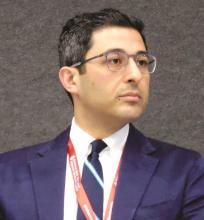HOUSTON – Following an embolic stroke of undetermined source, a patient’s serum level of brain natriuretic peptide may identify patients at high risk of having covert atrial fibrillation that warrants assessment by prolonged arrhythmia monitoring, based on a post hoc analysis of data collected from 373 patients.
The analysis showed that in older patients with a recent embolic stroke of undetermined source (ESUS) who had a serum brain natriuretic peptide (BNP) level of 100 pg/mL or greater, the prevalence of atrial fibrillation (AF) detected by up to 30 days of Holter monitoring was 33%. In contrast the AF prevalence was 4% among similar ESUS patients with a lower BNP level, Rolf Wachter, MD, said at the International Stroke Conference sponsored by the American Heart Association.
If BNP is 100 pg/mL or greater, then long-term monitoring for AF is “very efficient,” said Dr. Wachter, professor at the German Center for Cardiovascular Research in Göttingen, Germany. Of the 373 patients in his study who underwent BNP assessment, 61 (16%) had a BNP level at or above 100 pg/mL, strongly suggesting that prolonged arrhythmia monitoring can be focused on this selected subgroup. “It’s time to measure BNP” in patients with ESUS, he concluded.“This evidence is pretty compelling,” commented Hooman Kamel, MD, a neurologist at Weill Cornell Medicine in New York. “We already use other lab tests that have less evidence supporting their use than this, and checking BNP is a simple lab test.”
Dr. Wachter used data collected in the FIND-AFRANDOMISED (Finding Atrial Fibrillation in Stroke – Evaluation of Enhanced and Prolonged Holter Monitoring) trial, which enrolled 398 patients at four German centers with a recent ESUS and no history of AF and who were at least 60 years old. The primary endpoint of the study compared the efficacy of up to 30 days of Holter monitoring in these patients against a standard assessment after ESUS that included at least 24 hours of arrhythmia monitoring.The results showed that monitoring identified AF in 5% of the control patients and in 14% of those who underwent extended monitoring, a statistically significant difference (Lancet Neurol. 2017 Apr;16[4]:282-90).
Dr. Wachter and his colleagues had baseline BNP measurements for 373 of the patients and analyzed the prevalence of AF based on these levels. The patients averaged 72 years old. Among those with BNP values of at least 100 pg/mL, prolonged arrhythmia monitoring found AF in 33%, while briefer, conventional monitoring found AF in about 4%. This meant that for every three patients receiving prolonged arrhythmia scrutiny in this subgroup, the assessment found one patient with AF. But among patients with a serum BNP of less than 100 pg/mL, prolonged arrhythmia assessment yielded a 10% rate of AF detection, compared with about 4% in the controls, meaning that for every 18 patients screened prolonged Holter monitoring detected one additional case of AF, he reported.
This relationship presumably exists because higher BNP levels identify patients with structural heart abnormalities, a subgroup at increased risk for AF, Dr. Wachter explained. He cautioned that, because this was a post hoc analysis, he would like to see the findings confirmed in prospective studies.
Dr. Wachter has been a speaker on behalf of Bayer, Boehringer Ingelheim, Bristol-Myers Squibb, Pfizer, and Daiichi Sankyo and has received research support from Boehringer Ingelheim. The FIND-AFRANDOMISED trial received funding from Boehringer Ingelheim.
On Twitter @mitchelzoler



